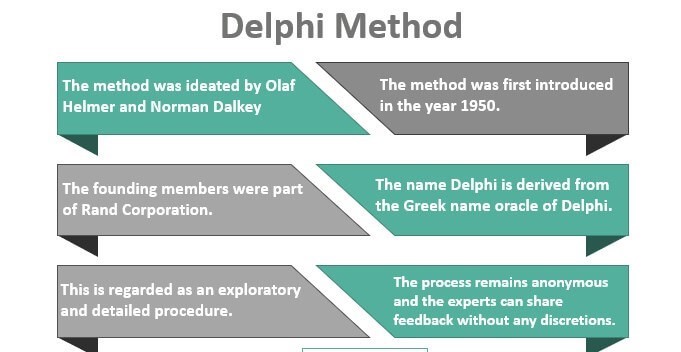Delphi Technique a Step-by-Step Guide
As a project manager, it is important to think about what future events may impact your projects. These events may be positive or negative, so understanding them allows you to prepare, and put plans in place to deal with them. But how can you forecast the future with any degree of certainty? The Delphi Technique can help.
The Delphi Technique is a method used to estimate the likelihood and outcome of future events. A group of experts exchange views, and each independently gives estimates and assumptions to a facilitator who reviews the data and issues a summary report.

The group members discuss and review the summary report, and give updated forecasts to the facilitator, who again reviews the material and issues a second report. This process continues until all participants reach a consensus.
The experts at each round have a full record of what forecasts other experts have made, but they do not know who made which forecast. Anonymity allows the experts to express their opinions freely, encourages openness and avoids admitting errors by revising earlier forecasts.
This article looks at how to run a Delphi session. On completion of this guide, you will be able to run a session enabling you to predict future events and their likely impact on your projects.
The technique is an iterative process, and first aims to get a broad range of opinions from the group of experts. The results of the first round of questions, when summarised, provide the basis for the second round of questions. Results from the second round of questions feed into the third and final round.
The aim is to clarify and expand on issues, identify areas of agreement or disagreement and begin to find consensus.
Step 1: Choose a Facilitator
The first step is to choose your facilitator. You may wish to take on this role yourself, or find a neutral person within your organisation. It is useful to have someone that is familiar with research and data collection.
Step 2: Identify Your Experts
The Delphi technique relies on a panel of experts. This panel may be your project team, including the customer, or other experts from within your organisation or industry. An expert is, any individual with relevant knowledge and experience of a particular topic. ¹
Step 3: Define the Problem
What is the problem or issue you are seeking to understand? The experts need to know what problem they are commenting on, so ensure you provide a precise and comprehensive definition.
Step 4: Round One Questions
Ask general questions to gain a broad understanding of the experts view on future events. The questions may go out in the form of a questionnaire or survey. Collate and summarise the responses, removing any irrelevant material and looking for common viewpoints.
Step 5: Round Two Questions
Based on the answers to the first questions, the next questions should delve deeper into the topic to clarify specific issues. These questions may also go out in the form of a questionnaire or survey. Again, collate and summarise the results, removing any irrelevant material and look for the common ground. Remember, we are seeking to build consensus.
Step 6: Round Three Questions
The final questionnaire aims to focus on supporting decision making. Hone in on the areas of agreement. What is it the experts are all agreed upon?
You may wish to have more than three rounds of questioning to reach a closer consensus.
Step 7: Act on Your Findings
After this round of questions, your experts will have, we hope, reached a consensus and you will have a view of future events. Analyse the findings and put plans in place to deal with future risks and opportunities to your project.
Conclusion
Use the Delphi Technique for creating Work Breakdown Structures, identifying risks and opportunities, compiling lessons learned and anytime you would usually conduct a brainstorming session.
Predicting the future is not an exact science, but the Delphi Technique can help you understand the likelihood of future events and what impact they may have on your project.

It’s a shame you don’t have a donate button! I’d certainly donate to this outstanding blog! I suppose for now i’ll settle for bookmarking and adding your RSS feed to my Google account. I look forward to new updates and will share this blog with my Facebook group. Talk soon!
Your writing has a way of resonating with me on a deep level. It’s clear that you put a lot of thought and effort into each piece, and it certainly doesn’t go unnoticed.
This is exactly what I was looking for. Thanks for the useful information.